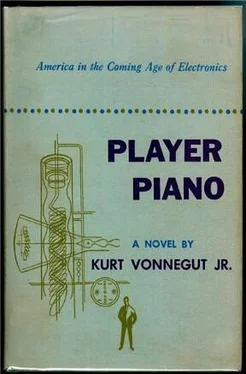"But he was great, and nobody'd argue about that, but do you think he could of been great today, in this modern day and age? Wheeler? Elm Wheeler? You know what he would be today? A Reek and Wreck, that's all. The war made him, and this life would of killed him.
"And another nice thing about war - not that anything about war is nice, I guess - is that while it's going on and you're in it, you never worry about doing the right thing. See? Up there, fighting and all, you couldn't be righter. You could of been a heller at home and made a lot of people unhappy and all, and been a dumb, mean bastard, but you're king over there - king to everybody, and especially to yourself. This above all, be true to yourself, and you can't be false to anybody else, and that's it - in a hole, being shot at and shooting back.
"These kids in the Army now, that's just a place to keep 'em off the streets and out of trouble, because there isn't anything else to do with them. And the only chance they'll ever get to be anybody is if there's a war. That's the only chance in the world they got of showing anybody they lived and died, and for something, by God.
"Used to be there was a lot of damn fool things a dumb bastard could do to be great, but the machines fixed that. You know, used to be you could go to sea on a big clipper ship or a fishing ship and be a big hero in a storm. Or maybe you could be a pioneer and go out west and lead the people and make trails and chase away Indians and all that. Or you could be a cowboy, or all kinds of dangerous things, and still be a dumb bastard.
"Now the machines take all the dangerous jobs, and the dumb bastards just get tucked away in big bunches of prefabs that look like the end of a game of Monopoly, or in barracks, and there's nothing for them to do but set there and kind of hope for a big fire where maybe they can run into a burning building in front of everybody and run out with a baby in their arms. Or maybe hope -though they don't say so out loud because the last one was so terrible - for another war. Course, there isn't going to be another one.
"And, oh, I guess machines have made things a lot better. I'd be a fool to say they haven't, though there's plenty who say they haven't, and I can see what they mean, all right. It does seem like the machines took all the good jobs, where a man could be true to hisself and false to nobody else, and left all the silly ones. And I guess I'm just about the end of a race, standing here on my own two feet.
"And I'm lucky barbering held out as long as it did - long enough to take care of me. And I'm glad I don't have any kids. That way it comes out even, and I don't have to think about this shop not being here for them, about nothing being for them but the Army or the Reeks and Wrecks, probably - unless an engineer or manager or research man or bureaucrat got at my wife, and the kids had their brains instead of mine. But Clara'd let one of those jerks at her just about as quick as you could stuff a pound of oleomargarine up a cat's ass with a hot awl.
"Anyway, I hope they keep those barber machines out of Miami Beach for another two years, and then I'll be ready to retire and the hell with them. They had the man who invented the damn things on television the other night, and turns out he's a barber hisself. Said he kept worrying and worrying about somebody was going to invent a haircutting machine that'd put him out of business. And he'd have nightmares about it, and when he'd wake up from them, he'd tell hisself all the reasons why they couldn't ever make a machine that'd do the job - you know, all the complicated motions a barber goes through. And then, in his next nightmare, he'd dream of a machine that did one of the jobs, like combing, and he'd see how it worked clear as a bell. And it was just a vicious circle. He'd dream. Then he'd tell hisself something the machine couldn't do. Then he'd dream of a machine, and he'd see just how a machine could do what he'd said it couldn't do. And on and on, until he'd dreamed up a whole machine that cut hair like nobody's business. And he sold his plans for a hundred thousand bucks and royalties, and I don't guess he has to worry about anything any more.
"Ever stop to think what a funny thing the human mind is? And there you are, sir, how's that look to you?"
" Sumklish ," said the Shah, and he took a long drink from the flask Khashdrahr handed him. He studied himself soberly in the mirror Bigley held up for him. " Nibo bakula ni provo ," he said at last.
"He likes it?" asked Bigley.
"He says it's nothing a turban won't cover," said Khashdrahr, whose haircut was also over. He called to Halyard. "Your turn, Doctor."
"Hmmm?" said Halyard absently, looking up from the letter. "Oh - no haircut for me. Think we ought to go back to the hotel for a rest, eh?" He glanced at the letter once more:
My dear Mr. Halyard:
We have just completed an audit of the personnel cards for our Department, checking the information coded on them against the facts.
During this audit, it was discovered that you failed to meet the physical-education requirements for a bachelor's degree from Cornell University, and that the degree was awarded you through a clerical oversight of this deficiency. I regret to inform you that you are, therefore, technically without a bachelor's degree, and, hence, technically ineligible for the M.A. and Ph.D. degrees which also appear on your record.
Since there are, as you know, severe penalties for willfully coding false information on personnel cards, we are obliged to advise you that you are officially without a college degree of any sort, and that you are transferred from staff to probationary status for a period of eight weeks, in which time you will return to Cornell and make up this deficiency.
Perhaps you can work this small chore into your itinerary, and give the Shah an opportunity to see a representative American institution of higher learning.
I have been in touch with Cornell about this mix-up, and they assure me that they will arrange for you to take the physical-education tests whenever you like. You will not have to take the course, but only the final examinations. These tests, I understand, are quite simple: swim six lengths of the swimming pool, do twenty pushups, fifteen chinnings, climb a rope, stand on your .
THE moon was full over the Thousand Islands, and, on one of them at least, there were a thousand eyes to see it. The cream of the East and Middle West, engineeringwise and managerwise, was met in the amphitheater of the Meadows. It was the second night, the night of the keynote play and the bonfire. The stage in the center of the circling stone seats was hidden beneath a pair of steel quarter-spheres, which would presently open like the shells of a steamed quahog.
Kroner sat down next to Paul and laid his hand on Paul's knee. "Nice night, boy."
"Yessir."
"Think we've got a good team this year, Paul."
"Yessir. They look good." After one day of competition, the Blue Team did look good, good despite the large proportion of top - hence tired and old - executives in its ranks. That afternoon the Blues had knocked the captain of the Greens, Shepherd, out of the box after three innings. Shepherd, in his determination to win and his horror of losing, had blown up completely.
Paul, by contrast, had played heads-up ball all the way, effortlessly, laughingly, wholly out of character. In analyzing the magical quality of the afternoon during the cocktail hour, Paul realized what had happened: for the first time since he'd made up his mind to quit, he really hadn't given a damn about the system, about the Meadows, about intramural politics. He'd tried not to give a damn before, but he hadn't had much luck. Now, suddenly, as of the afternoon, he was his own man.
Читать дальше








![Курт Воннегут - Вампитеры, фома и гранфаллоны [litres]](/books/397997/kurt-vonnegut-vampitery-foma-i-granfallony-litre-thumb.webp)